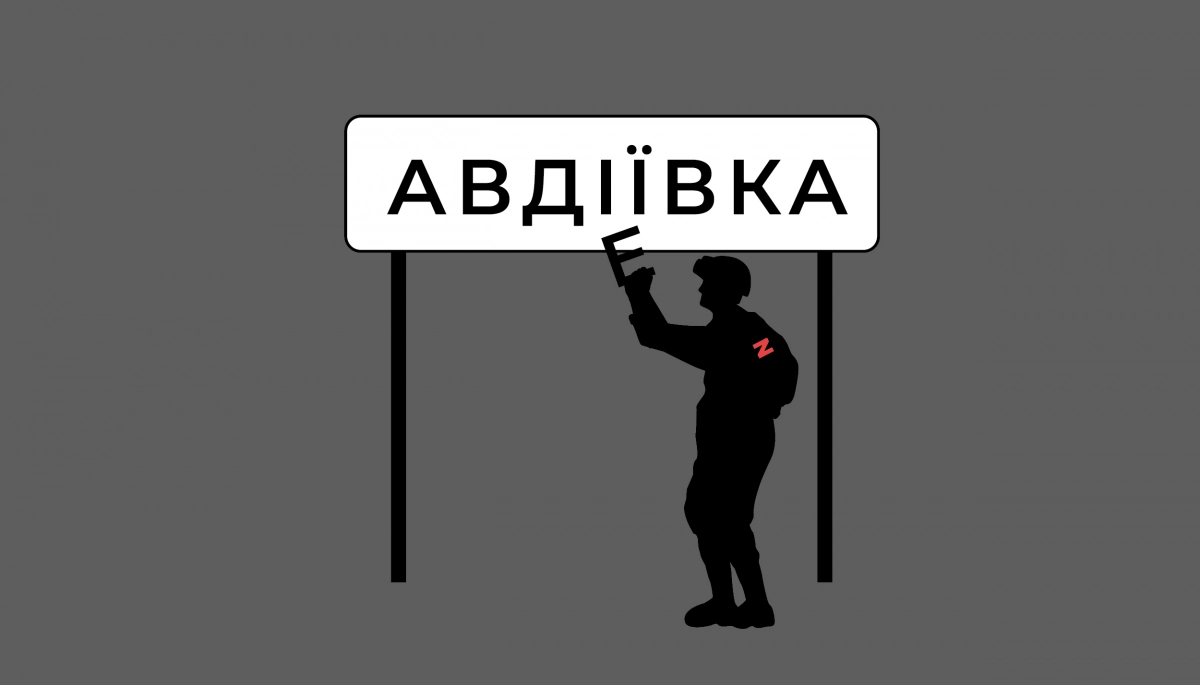Українською читайте тут.
On February 17, the Commander-in-Chief of the Armed Forces of Ukraine, Oleksandr Syrskyy, announced the withdrawal of Ukrainian troops from the city of Avdiivka, located less than 10 kilometers from Donetsk. The defense of the city has been ongoing since 2014. However, the Russians presented the city's capture as an easy victory. "For ten years, Ukrainians filled Avdiivka with concrete, but it was destroyed in 10 days," wrote the Crimean propagandist Telegram channel, which has almost 57,000 subscribers. "After the capture of Avdiivka, the Russian Army is moving forward," stated the Telegram channels with 247 and 11,000 subscribers, covering the news from the war zone in Russia’s favorable spirit.
Two days after the announcement of the withdrawal of Ukrainian troops from Avdiivka, pro-Russian Telegram channels continued to discuss topics that aimed to please Russia's supporters. These channels used the lack of information about the circumstances of the Ukrainian exit from the city and the number of soldiers who could not evacuate to wreck Ukrainians’ nerves. In the meantime, other propagandists bullied Russian "military correspondent" Andrey Morozov because he reported that since October 2023, when the powerful offensive on Avdiivka began, the Russians had lost 16,000 soldiers. Afterwards, Morozov committed suicide.
Russian propagandists went on and, in several Telegram channels with an audience of 11,000 and 208,000 subscribers, wrote that the purpose of capturing Avdiivka was "to create the prerequisites for the fall of the first domino, which will mark the beginning of the end of Bandera defense’s integrity."
During February 19 and 20, the TeleZip / Mantis Analytics system found 1,397 publications in 137 pro-Russian Telegram channels on a query with derivatives of the word "Avdiivka" in Russian and Ukrainian. The request focused on pro-Russian Telegram channels, which Detector Media discussed in the Kremlin Hydra study at the beginning of January 2023. These publications fit into the traditional themes of Russian messages about residents of the captured territories allegedly waiting for the arrival of the Russians. The loss of Avdiivka "means the loss of Ukraine's support from its partners" or "civilian and military leaders of Ukraine manipulate public opinion and lack the experience to oppose the Russians."
Topics of messages in pro-Russian Telegram channels with mentions of Avdiivka
One-fifth of the messages in the sample were aimed at supporting the feeling of euphoria among pro-Russian Telegram users because the Russian military captured Avdiivka. Almost every eighth message discussed that the residents of Avdiivka joyfully greeted the Russians, were preparing to receive 10,000 rubles in payments, and that the Ukrainian military surrendered with relief. Before the beginning of the Russian invasion of Ukraine, more than 35,000 people lived in Avdiivka, and during the autumn-winter offensive of the Russians, only 1,336 civilians remained in the city.
Propagandists spread the claim that Ukrainian soldiers who surrendered to the Russians made "the right choice because they were saving their lives." In particular, this was mentioned in a pro-Russian Telegram channel with 41,000 subscribers, spreading pro-Russian views in the Kharkiv region. However, as became known from the report of the 110th separate mechanized brigade named after Lieutenant-General Mark Bezruchka, the Russians once again committed war crimes and executed at least three Ukrainian service members. It is worth adding that this is not the first time that the Russian military has disseminated how they execute Ukrainian prisoners on social networks. In January, DM reported that the Russians were distributing videos of executions and robberies of killed service members.
In response to accusations of war crimes, the Russians resorted to mirror propaganda tactics: they denied the executions of prisoners of war and accused Ukrainians of war crimes. Moreover, allegedly, the Russian military found a torture place in Avdiivka and also assured:
"There is an omen: if Khokhly are spreading information that prisoners are being killed, then they are preparing for our offensive... Such statements only serve to frighten their soldiers and force them to stand on the front line till the end. The same happened in Artemovsk (now Bakhmut — DM’s note), in Mariinka, and it was the same in Avdiivka," wrote the pro-Russian Telegram channel with 247,000 subscribers.
Telegram channels also manipulated the statistics of the number of dead and captured service members. On February 21, Russians spread information that several hundred to a thousand service members could remain in Avdiivka and still be captured. Dmytro Lykhoviy, spokesman for the operational and strategic grouping of the Tavria troops, denied the information about hundreds of prisoners:
"During the final stage of the Avdiivka defense operation, and I have repeatedly emphasized that the Armed Forces of Ukraine did not hide this, a certain number of service members did not get back in touch... These statements of Russian propaganda regarding hundreds and thousands of prisoners are complete misinformation, which is nothing not confirmed. We said: yes, there are captives, but this number is not calculated in hundreds. At the same time, we remember every soldier and will fight for their release."
For Russian supporters, the continuation of hostilities two days after Avdiivka’s capture was explained by the need to move the Armed Forces of Ukraine further from Donetsk so that they would not shell the "capital". There were at least 28 such messages in the data set. Since 2014, Russian propaganda has used the "shelling of Donetsk" thesis as a justification for aggression against Ukraine. After the capture of Avdiivka, propagandists continued to use this argument. They assure the Russian forces will have to capture another hundred kilometers more. This logic is consistent with Putin's words that "Russia's borders do not end anywhere", and therefore, it is possible to fight endlessly to create buffer zones for buffer zones. Russian propagandist Andrey Mikheev is one of the representatives of the point that it is not worth being too excited about capturing Avdiivka but rather focusing on capturing new territories. His opinion was spread by the Telegram channel with more than 200,000 subscribers:
"Furthermore — no, we can't be happy with Avdiivka [the capture of the city] alone. But its capture should not be underestimated either: firstly, it still pushes the front line away from the city limits; secondly, it opens up space for our fighters in the southwestern direction. Don't deceive yourself. There is still a lot of work ahead."
A little more than five percent of the messages contained opinions of posts’ authors in pro-Russian Telegram channels regarding the damage to the Armed Forces of Ukraine caused by the capture of Avdiivka. For example, due to the transfer of reserves to Avdiivka, the Armed Forces of Ukraine needlessly lost combat units, as reported in a pro-Russian Telegram channel with 247,000 subscribers.
However, more often, the authors of posts in pro-Russian Telegram channels reinforced messages about issues due to the loss of Avdiivka with "third parties" positions, which would please Russia’s supporters. Ukrainian military and foreign experts served as "experts" this time. In particular, an occupational Telegram channel with almost 21,000 subscribers relayed a description of Russian tactics in Avdiivka to the Ukrainian military only to summarize it: "Even if only part of what was written is true, it means that our army reached a fundamentally different level of mastery of the art of war, which seemed unattainable two years ago."
Sometimes, the quotes from third parties were too general, like predictions or weather forecasts: "Shortly, a difficult situation may arise not only in Avdiivka but also in the south, as well as in the northern districts of Kharkiv region and Kupyansk." Sheikh Tamir, a pro-Russian blogger with 409,000 followers, shared this quote. In another post, he quoted a 20-second clip of a Russian-voiced video commentary by US expert Earl Rasmussen, who is cited only by Russian media. Here is the quote: "The liberation of Avdiivka by the Russian army shows that the conflict is gradually ending." Unfortunately, from the 20-second cut with several clips translated into Russian, it is difficult to establish whether the pro-Russian media "ecosystem" expert Earl Rasmussen said exactly what Sheikh Tamir wrote.
Earl Rasmussen in the Google search
While the Russians were establishing control over Avdiivka, the Munich Security Conference continued. Propagandists combined two events, citing foreign publications. For example, discussing the Munich conference, a pro-Russian Telegram channel with 128,000 subscribers referred to the Le Figaro newspaper:
"Last year at the Munich conference, the leaders believed in the victory of Ukraine, but now they are leaning towards the fact that Russia will win the conflict, writes Le Figaro... In addition, Europeans have their own reasons for concern: in particular, if Donald Trump comes to power in the United States, Europeans cannot decide how to treat him: there is a camp of those who favor reconciliation and those who panic in advance."
In part, this generalization and warning that democratic countries underestimate the need to build up defense reflects the characteristics of the Munich Security Conference by observers of international politics. Moreover, the Munich Security Conference also reflected the attitude regarding Ukraine's victory among the citizens of 12 European states, whom YouGov sociologists surveyed in January. According to this poll, almost every tenth respondent believes in Ukrainians' ability to defeat Russia on the battlefield. One in five believes in Russia's victory, and more than a third expect the war to end with a peace agreement. So far, a peace agreement is not possible without Ukraine coming to terms with demands to cede occupied territories to Russia. The majority of Ukrainians do not support this point of view. After all, 52% of respondents surveyed by the Kyiv International Institute of Sociology at the beginning of February believe that the most realistic result of the end of hostilities will be restoring Ukraine's control over all occupied territories.
Answers of KMIS respondents to the question, "In your opinion, what looks like the most realistic outcome of the war for Ukraine?"
Ukrainian society will continue to push its partners to help repel the Russians. After all, according to Levada Center sociologists’ polling of Russians from 2018 to 2023, the main enemy of Russia is the USA, the state with the largest army among NATO members. At the same time, in 2018, they called Ukraine their main enemy. Citizens of European NATO member states, according to opinion polls, do not want to fight with Russia, and some of them, such as the Czech Republic, are not sure of the possibility of defending themselves from Russia. It is in the interests of Ukraine's allies not to lead to the transfer of armed actions to their territories, giving way to Russia and reducing their support for Ukraine.
Main page collage and infographics credits: Natalia Lobach



